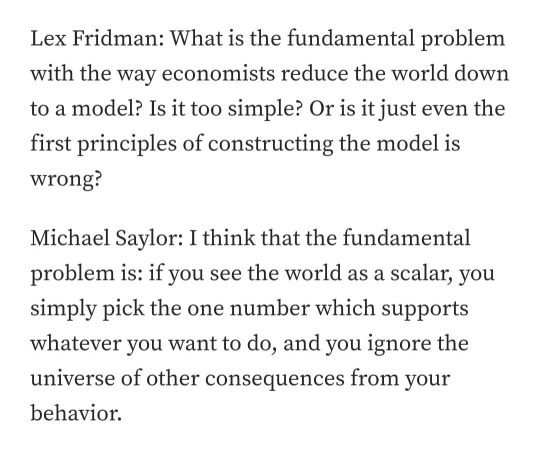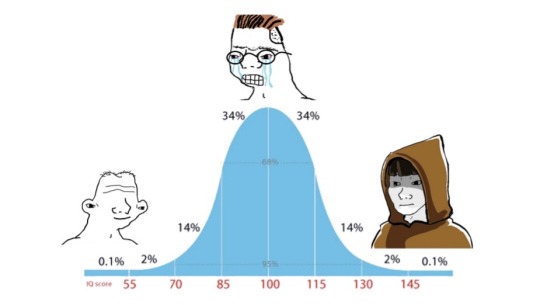Text
As a matter of US constitutional law, the argument “I should be allowed to commit securities fraud because of freedom of speech and the First Amendment” is wrong, but it has a respectable intellectual pedigree. You can see its appeal. The US Securities and Exchange Commission does pretty intrusively regulate speech, in a way that would not be acceptable in most areas of US law. And if the First Amendment protects anything, it protects the right to lie to the public. But not about securities.
On the other hand, the composition of the US courts is changing; they are becoming more skeptical of regulatory agencies and more receptive to arguments that regulatory restrictions on freedom are unconstitutional. It’s worth trying, every now and then, to see if the US Supreme Court might change its mind and decide that, actually, freedom of speech does require the right to commit securities fraud.
Really I think perjury is protected by the first amendment
22 notes
·
View notes
Text
I’d put it this way; if you asked an oncologist to treat high blood pressure, they would most likely have enough general knowledge to make a sensible decision. If you asked a marine engineer to design a road tunnel, they would say they weren’t qualified to do so. If you ask a lawyer to give an opinion on a politically controversial subject that’s way outside their area of expertise, then … ok, bad example, economists are not the only ones I agree.
But in economics, you all too often come across people who don’t have a sufficient baseline of knowledge outside their specialty, but who either aren’t aware of this or don’t see it as a reason not to give advice. Ironically, I think that at the root of this problem is a lack of respect for economics; they know that their own speciality is complicated, fragile and beset by special cases, but their perception of all the rest of economics is that it’s pretty easy stuff which can be figured out from first principles in a coffee break with a few simple axioms.
(x)
Matt Darling showcasing some blast-from-the-past "what is wrong with economics" takes that are apparently preserved in amber from 2008 being retold in 2024:

"Don't economists know that scalar models aren't everything" wow. amazing.

"hAvE yOu tRiEd SyStEm DyNaMiCs" fucking lmao
Anyway our boy Michael Saylor continues by asking "hasn't anyone tried tracking price changes for specific goods?" - inquiring minds at the BLS want to hear more. Will you be shocked to learn this guy is an ex-tech CEO who is now really into Bitcoin??
Back in 2008, the financial crisis hit the world, and while the idea that it was "economist's fault" like they were running things somehow was very silly, its fair to say it was a black mark on a lot of mainstream macro people - it did cause some solid revisions & debates. And in the dissident econ era of that time, it became a "thing" to talk about economics as this sort of backward institution, obsessed with models disconnected from reality and privileging math over data, since if macro was vulnerable the whole field was.
This critique was fully outdated at the time, but I will least credit that it takes time for people to catch up to the frontier, and the critiques were like a bit valid about say 1980's economics - with the extremely obvious caveat that they lacked affordable computers then and so couldn't do shit like system dynamics, but w/e. Still, if it was outdated in 2008, its laughably off the mark in 2024, discussing an econ field flush with econometrics, measurement & big data, and diverse mathematical and computational methods. But since the ideas of 2008 were foundational to so many dissident movements - like crypto for example - they continue to march on, divorced from their place and time.
Fun to see an old friend I guess; how ya been since Occupy Wall St eh?
37 notes
·
View notes
Text
The thing is that economics gains this variety by having a lot more headcount than competing social sciences, and by being very specialised. And that means that while “economics” as a subject can be so much more sophisticated and realistic, if you randomly select an economist and randomly select an economics topic, your most likely outcome is that you’ll be dealing with a level of expertise and sophistication that is exactly, identically equal to a half-remembered undergraduate textbook answer.
A necessary consequence of the division of intellectual labour is that outside their particular area of specialisation, economists’ understanding often falls away very sharply indeed. In my experience, a solid majority of microeconomists believe something like the loanable funds theory of the interest rate. Anyone who isn’t specialised in labour economics is very likely indeed to model employment as if it was the supply and demand for a good; it’s quite unusual for a non-specialist to understand that the cost of housing is rent rather than house prices. And so on.
(x)
Matt Darling showcasing some blast-from-the-past "what is wrong with economics" takes that are apparently preserved in amber from 2008 being retold in 2024:

"Don't economists know that scalar models aren't everything" wow. amazing.

"hAvE yOu tRiEd SyStEm DyNaMiCs" fucking lmao
Anyway our boy Michael Saylor continues by asking "hasn't anyone tried tracking price changes for specific goods?" - inquiring minds at the BLS want to hear more. Will you be shocked to learn this guy is an ex-tech CEO who is now really into Bitcoin??
Back in 2008, the financial crisis hit the world, and while the idea that it was "economist's fault" like they were running things somehow was very silly, its fair to say it was a black mark on a lot of mainstream macro people - it did cause some solid revisions & debates. And in the dissident econ era of that time, it became a "thing" to talk about economics as this sort of backward institution, obsessed with models disconnected from reality and privileging math over data, since if macro was vulnerable the whole field was.
This critique was fully outdated at the time, but I will least credit that it takes time for people to catch up to the frontier, and the critiques were like a bit valid about say 1980's economics - with the extremely obvious caveat that they lacked affordable computers then and so couldn't do shit like system dynamics, but w/e. Still, if it was outdated in 2008, its laughably off the mark in 2024, discussing an econ field flush with econometrics, measurement & big data, and diverse mathematical and computational methods. But since the ideas of 2008 were foundational to so many dissident movements - like crypto for example - they continue to march on, divorced from their place and time.
Fun to see an old friend I guess; how ya been since Occupy Wall St eh?
37 notes
·
View notes
Text
Some in India have bristled at what they perceive as a Western double standard. Citing the campaigns of targeted killings carried out by the United States after the Sept. 11, 2001, attacks, they question why Delhi should not be entitled to take similar measures against those it deems terrorists.

66 notes
·
View notes
Text
As Sikhs settled into their new lives abroad, the Khalistani cause went quiet until a new generation of activists —whose leaders included Pannun and Nijjar — sought to rekindle the movement with unofficial referendums on Sikh statehood and with protests that at times have seemed to glorify violence. A parade in Canada last year included a float depicting Indira Gandhi’s assassination, and Khalistan supporters have stormed and defaced Indian diplomatic facilities in Western cities.
The effort has seemed to gain little traction beyond a minority within the diaspora community. Even so, it has been portrayed as a resurgent menace by Modi and his Hindu nationalist Bharatiya Janata Party. Indian officials have accused Canada and the United States of harboring Sikh separatists who they say have plotted attacks and smuggled weapons into India.
Ajai Sahni, executive director of the Institute for Conflict Management in New Delhi and an expert on the insurgency in Punjab, said BJP depictions of the Sikh threat are “far in excess of what actually exists.” Officials have political incentive to exaggerate, he said, “because it is useful to polarize and to keep a threat alive so the state can present itself as a guarantor of security to 80 percent of the country — the Hindus — who are supposedly in danger.”
Yeah I was wondering how much of a threat "Sikh extremists" are right now to the government of India
5 notes
·
View notes
Text
I was just thinking that America's got a nice history of racial panic of imported organized crime from all over the world, Italy, Ireland, Japan, China, Mexico, but where are the tales of the Indian mafia?
18 notes
·
View notes
Text
Yadav and Gupta spent weeks trading encrypted texts about the plot to kill Pannun, according to a U.S. affidavit filed in support of the request for Gupta’s extradition. To find a willing assassin, Gupta reached out to someone he had been in touch with for at least eight years and understood to be a drug and weapons dealer. In reality, according to the affidavit, the supposed dealer was an informant for the U.S. Drug Enforcement Administration.
The two were discussing “another potential firearms and narcotics transaction,” according to the affidavit when, on May 30, Gupta abruptly asked “about the possibility of hiring someone to murder a lawyer living in New York.”
From that moment, U.S. agents had an inside but incomplete view of the unfolding conspiracy. They orchestrated Gupta’s introduction to a supposed assassin who was actually an undercover agent, according to court filings. They captured images of cash changing hands in a car in New York City — a $15,000 down payment on a job that was to cost $100,000 when completed.
Even nation-states can't find a hitman who's not a Fed
9 notes
·
View notes
Text
This examination of Indian assassination plots in North America, and RAW’s increasingly aggressive global posture, is based on interviews with more than three dozen current and former senior officials in the United States, India, Canada, Britain, Germany and Australia. Citing security concerns and the sensitivity of the subject, most spoke on the condition of anonymity.
That India would pursue lethal operations in North America has stunned Western security officials. In some ways, however, it reflects a profound shift in geopolitics. After years of being treated as a second-tier player, India sees itself as a rising force in a new era of global competition, one that even the United States cannot afford to alienate.
Asked why India would risk attempting an assassination on U.S. soil, a Western security official said: “Because they knew they could get away with it.”
3 notes
·
View notes
Text
Recent events making targets appear less vulnerable that they seemed before.
As the Congressional Budget Office remarked in rather stunned tones: “In CBO’s estimation, over the next 30 years, the Navy would spend a total of a little more than $1.0 trillion (in 2021 dollars) building the ships and unmanned systems in its December 2020 plan—an average of $34.1 billion per year. That amount of funding, each year for 30 years, would be unprecedented since World War II. Half of the funding would be for submarines, about one third would be for aircraft carriers and surface combatants, and the remainder would go toward amphibious ships, combat logistics and support ships, and other items.”

Was it “there are only two types of ships in a modern war, submarines and targets“
37 notes
·
View notes
Text
"Religious toleration," an idea invented by the french in the 17th century to justify more war
13 notes
·
View notes
Text
Not feeling great that basically all cows are infected with h5n1 at this point
7 notes
·
View notes
Text
Imagining the prompt you would need for the argumate-autoresponder.
argumate: unfortunately (or fortunately?) you really can’t replicate me from my Tumblr posts alone, no matter how many of them I make
Gonna show you with my upcoming GPT-2 argumate blog.
170 notes
·
View notes
Text
Believe that journalists don't know anything about the things they report on and write copy based purely on vibes
2 notes
·
View notes
Text
Prior survey research has mostly centered on the psychological dispositions and political leanings associated with conspiracy beliefs rather than underlying and potentially consequential status dynamics. Drawing on prior scholarship and recent national survey data, I analyze the social patterning of conspiracy beliefs and their variations by several status attributes. Notably, and rather than the typical assumption that such beliefs are mostly held by those of lower education, my findings point clearly to a bimodal (U-shaped) distribution by socioeconomic status. Specifically, and unique to my results, there exists a cluster of graduate-degree-holding white men who display a penchant for conspiracy beliefs. Further analyses highlight important variation between specific beliefs, with distinctly taboo beliefs being exceptionally popular among those in this highly educated group—a pattern corroborated with additional data sources. I conclude by discussing potential mechanisms and avenues that future sociological work on conspiracy beliefs might consider.

10 notes
·
View notes
Text
if i were the president of an american university and some far-right politician started rambling about God "cursing" my institution I think I'd just start talking like the villain out of a jack chick tract. "I am not afraid of your so-called God. Thanks to Charles Darwin's theory of evolution we now only worship monkeys, and communism"
472 notes
·
View notes
